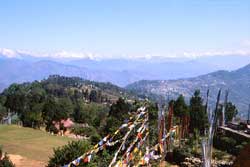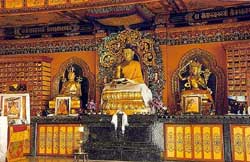 A trip outside Nepal is always refreshing and instructive. Consider, for example, the transformations this Beed witnessed on a recent pre-festival trip to Sikkim. Few places are more fascinating for Nepalis than Sikkim-an India-centric economy that was eventually annexed, and often Nepalis in Nepal fear their fate will follow that of this former Himalayan kingdom.
A trip outside Nepal is always refreshing and instructive. Consider, for example, the transformations this Beed witnessed on a recent pre-festival trip to Sikkim. Few places are more fascinating for Nepalis than Sikkim-an India-centric economy that was eventually annexed, and often Nepalis in Nepal fear their fate will follow that of this former Himalayan kingdom.
The border town of Rangpo presents an interesting phenomenon-the difference between the states of West Bengal and Sikkim. Cross a bridge and see the difference in standards of living. The change is something like that between Mahendranagar and Banbasa or Tatopani and Khasa. There is a difference in the way shops are lined up, in the organisation of the markets and the tall buildings supposed to reflect \'development.'
There are signboards welcoming one to the kingdom of flowers, and those fickle beasts, tourists, are around. Sikkim's recent efforts at taking tourism seriously have some lessons for the travel trade set here.
Gangtok is just a few kilometres across, but they still care about making sure their traffic moves smoothly. As for the often negative impact tourism has, like on the environment and on pollution levels, Sikkim is doing all it can to tackle this, too. Plastic bags are banned. People carry shopping bags and the more up-market stores provide fancy paper bags. There are prominent notices warning those who litter about a Rs 5,000 fine. And guess what? Gangtok is clean. Such messages are not just dreary sermons that pass the average resident by. Everyone understands the importance of such moves, and most locals take pride in how well they manage to implement their planners' suggestions.
While it was nice to be in Gangtok as a tourist, it wasn't so great from a Nepali perspective. Here was a one-horse town flooded with tourists, and poor old Kathmandu is just sort of limping along.  Worse, talking to some of the tourists in Sikkim, one had to contend with the fact that Nepal was simply not on their travel map. They tell many stories about insecurity and the state of the country, stories unheard of in Nepal. From the now-ubiquitous security point of view, Nepal is the same as, oh, Assam or even Kashmir. Those who come and then cross the border into India tell of being frisked, always odious, but somehow worse when all one wants to do is kick back and relax.
Worse, talking to some of the tourists in Sikkim, one had to contend with the fact that Nepal was simply not on their travel map. They tell many stories about insecurity and the state of the country, stories unheard of in Nepal. From the now-ubiquitous security point of view, Nepal is the same as, oh, Assam or even Kashmir. Those who come and then cross the border into India tell of being frisked, always odious, but somehow worse when all one wants to do is kick back and relax.
Even apart from tourism, Sikkim is doing quite all right. Hydropower, that we think so highly of here, is a matter of envy when done Sikkim-style. Projects as large as 510 MW have been identified and are on the drawing board. If hydro can be a leading industry in Sikkim and Bhutan, why not in Nepal. Sikkim also has the highest tele-density in India, and the new focus on IT guarantees some pretty interesting developments here in the future.
This isn't a perfect place-the cocktail circuit is abuzz with who has \'made' what. The craft of graft is finely honed here, but it does not stop positive action. Most political parties have been committed to development, and it shows.
Sikkim isn't a one-off-plenty of good has come about in Bhutan, too, and for us in another Himalayan kingdom, this should be the cue to take some time out for introspection and setting some solid goals.



